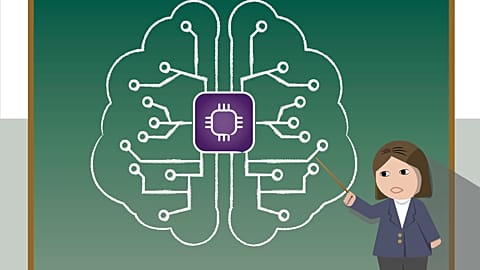What drives employee happiness at work? The answer depends on the generation, research finds.
It’s perhaps hardly news and may be obvious, but happiness makes people more productive at work, research has shown. Happy employees have proven to be more committed, productive, and loyal, which is good for business.
 ADVERTISEMENT
ADVERTISEMENT
 ADVERTISEMENT
ADVERTISEMENT
The increasing recognition of this fact has spurred a surge in research exploring how workplace culture can impact people’s well-being.
And it hasn't taken long for companies like Google and Spotify to scale up their investment in employee support, including appointing Chief Happiness Officers (CHO) to do just that.
But what does happiness at work look like? Is it more vacation days, better facilities or mental health support? Is it the ability to work remotely more often, or perhaps being offered greater opportunities for personal development?
A recent study has determined it ultimately depends on the generation, with some groups proving to be more difficult to please than others.
What drives employee happiness at work?
Dr. Katherine Chia, an American cognitive scientist at Cangrade, a talent management company, deemed the most effective way to determine what drives job satisfaction was to ask employees directly.
In a new study, she surveyed over 600 members of each generation represented in the workforce to learn how they responded to the question “In general, how happy are you at work?”
Chia also asked participants to rate their current workplace experiences and respond to statements such as “my workplace cares about me” or “I am proud of the work I do”.
She and her team then dug into the different levels of job satisfaction, analysed the different generations’ behaviours and published the results in a study titled “Happiness at Work in 2023, a Study on Generation Happiness”.
Happiness, a generation dilemma
Though the exact years that define each generation may differ according to the researcher, it is widely accepted that there are four groups widely represented in today’s workplace: Baby Boomers (approximately 1955-1964) Gen X (from around 1965-1980), Millennials (1981-1996) and Gen Z (1997-2012).
Each generation has different values, which can often be the root of workplace conflict and unhappiness, according to the report. For example, a Baby Boomer’s management style might not complement the needs or preferences of a Gen Z employee.
What were the Happiness at Work research findings?
Chia’s team found that all generations report similar levels of workplace satisfaction, with one exception: Gen Z appear to be significantly less satisfied.
Gen X are the most satisfied generation at work, reporting a 5.5 level of satisfaction on a scale from one to seven. They are followed by Baby Boomers (5.47), Millennials (5.41) and Gen Z, the least satisfied (4.76).
Interestingly, Gen Z also proved to be the unhappiest of all evaluated generations, with all the other generations reporting to be similarly happy at work.
Some experts differentiate between the meaning of happiness and satisfaction at work. But the Happiness at Work in 2023 report uses the terms interchangeably throughout the paper.
Gen X and Millenials feel similar happiness levels, and Baby Boomers are not far behind.
Only 9 per cent of Baby Boomers showed to be unhappy at work, compared with 69 per cent who said they were.
Of Gen X and Millennials respondents, 13 per cent of both groups were unhappy versus 76 per cent who were happy. Gen Z were again the unhappiest (26 per cent compared to 59 per cent who were happy).
The reasoning behind Gen Z's unhappiness at work may be varied. But one reason may be simply because “Gen Z may also be less happy in general than other generations,” the report concluded.
The Mental Health Million Project supports this theory, which recently reported that Gen Z had alarmingly low mental well-being rates, likely due to the major disruption to education by the COVID-19 pandemic, it said.
Another “obvious” reason, according to the Happiness at Work report, is that Gen Z is still entering the workforce and are more likely to have entry-level roles. This, it says, can create frustration, particularly for a tech-savvy workforce that is largely defined by the instant gratification phenomenon.
But what exactly makes each generation happy and unhappy at work?
For Baby Boomers, the most valuable priority at work proved to be “having their voices heard,” said the report, which is associated with their “strong sense of organisational loyalty”.
Of Baby Boomers, 50 per cent agreed with the statement “I like telling people what I do for a living,” which Chia says highlights the generation’s career-centric mindset.
Baby Boomers also “most highly valued having their voices heard at the workplace, above and beyond other perks younger generations might value, such as flexible working hours or unlimited paid time off.”
Gen X and Millennials share workplace priorities: self-direction and autonomy.
But Gen X is “more nuanced” and they are also similar to Baby Boomers in that they place significant emphasis on their work identities.
Millennials are “deeply mission-driven in their careers,” they seek opportunities that will allow them to “give back” or have some higher purpose.
The most highly correlated sentiment with workplace satisfaction for the generation was “I am proud of the work I do”.
Gen Z’s workplace happiness is most highly correlated with the statement, “My work environment brings out the best in me”. The generation prioritises learning and professional development opportunities in their jobs.
Aligned with the job satisfaction insights, Gen Zs also proved to be the generation most likely to quit their job if they are unhappy with their workplace, the report found.
The Happiness at Work report says that fostering intergenerational understanding and collaboration will be crucial for organisations to thrive in today's workforce. And instead of perceiving generational differences as a challenge, employers should view them as an opportunity to drive business growth.

















